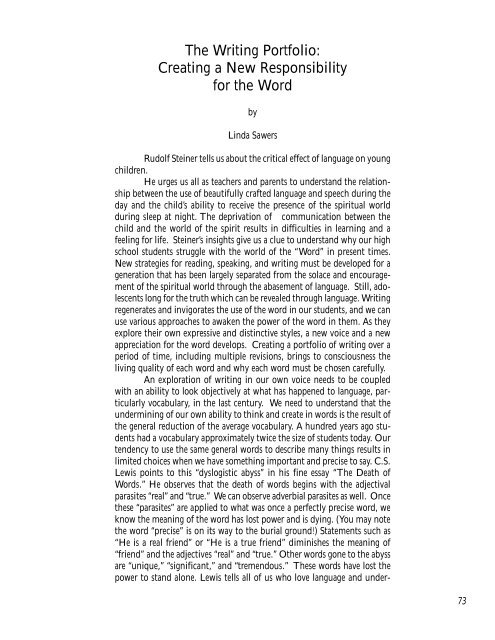Colloquium on English - Research Institute for Waldorf Education
Colloquium on English - Research Institute for Waldorf Education
Colloquium on English - Research Institute for Waldorf Education
You also want an ePaper? Increase the reach of your titles
YUMPU automatically turns print PDFs into web optimized ePapers that Google loves.
The Writing Portfolio:<br />
Creating a New Resp<strong>on</strong>sibility<br />
<strong>for</strong> the Word<br />
by<br />
Linda Sawers<br />
Rudolf Steiner tells us about the critical effect of language <strong>on</strong> young<br />
children.<br />
He urges us all as teachers and parents to understand the relati<strong>on</strong>ship<br />
between the use of beautifully crafted language and speech during the<br />
day and the child’s ability to receive the presence of the spiritual world<br />
during sleep at night. The deprivati<strong>on</strong> of communicati<strong>on</strong> between the<br />
child and the world of the spirit results in difficulties in learning and a<br />
feeling <strong>for</strong> life. Steiner’s insights give us a clue to understand why our high<br />
school students struggle with the world of the “Word” in present times.<br />
New strategies <strong>for</strong> reading, speaking, and writing must be developed <strong>for</strong> a<br />
generati<strong>on</strong> that has been largely separated from the solace and encouragement<br />
of the spiritual world through the abasement of language. Still, adolescents<br />
l<strong>on</strong>g <strong>for</strong> the truth which can be revealed through language. Writing<br />
regenerates and invigorates the use of the word in our students, and we can<br />
use various approaches to awaken the power of the word in them. As they<br />
explore their own expressive and distinctive styles, a new voice and a new<br />
appreciati<strong>on</strong> <strong>for</strong> the word develops. Creating a portfolio of writing over a<br />
period of time, including multiple revisi<strong>on</strong>s, brings to c<strong>on</strong>sciousness the<br />
living quality of each word and why each word must be chosen carefully.<br />
An explorati<strong>on</strong> of writing in our own voice needs to be coupled<br />
with an ability to look objectively at what has happened to language, particularly<br />
vocabulary, in the last century. We need to understand that the<br />
undermining of our own ability to think and create in words is the result of<br />
the general reducti<strong>on</strong> of the average vocabulary. A hundred years ago students<br />
had a vocabulary approximately twice the size of students today. Our<br />
tendency to use the same general words to describe many things results in<br />
limited choices when we have something important and precise to say. C.S.<br />
Lewis points to this “dyslogistic abyss” in his fine essay “The Death of<br />
Words.” He observes that the death of words begins with the adjectival<br />
parasites “real” and “true.” We can observe adverbial parasites as well. Once<br />
these “parasites” are applied to what was <strong>on</strong>ce a perfectly precise word, we<br />
know the meaning of the word has lost power and is dying. (You may note<br />
the word “precise” is <strong>on</strong> its way to the burial ground!) Statements such as<br />
“He is a real friend” or “He is a true friend” diminishes the meaning of<br />
“friend” and the adjectives “real” and “true.” Other words g<strong>on</strong>e to the abyss<br />
are “unique,” “significant,” and “tremendous.” These words have lost the<br />
power to stand al<strong>on</strong>e. Lewis tells all of us who love language and under-<br />
73

















